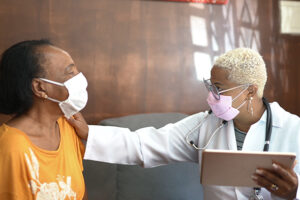Oncology
Chronic Myeloid Leukemia
COVID-19 in Chronic Myeloid Leukemia and Other Hematologic Malignancies
Overview
COVID-19–related data reported at the 63rd ASH Annual Meeting and Exposition included the specific experiences of a large group of patients with chronic myeloid leukemia (CML) from around the world.
Following these proceedings, featured expert Jorge E. Cortes, MD, was interviewed by Conference Reporter Editor-in-Chief Tom Iarocci, MD. Dr Cortes provides his clinical perspectives here.
Jorge E. Cortes, MDDirector, Georgia Cancer Center |
|
“It is important that we educate our patients so that they feel comfortable with getting the COVID-19 vaccine. There is no reason why an eligible patient with CML cannot have vaccine-afforded protection, even if the protection is at a somewhat lower level than that in the general population.”
Some general patterns can be observed among patients with hematologic malignancies who develop COVID-19. Those with chronic leukemias fare better than those with acute leukemias. Additionally, patients with myeloid malignancies often do better than patients with lymphoid malignancies. While less mortality from COVID-19 has been reported in patients with CML (a chronic myeloid disease) compared with what is observed in other cancers, mortality is perhaps higher than that of the general population, with worse outcomes seen in low-income countries.
A very informative study on this topic was presented at ASH 2021, reflecting the efforts of the International CML Foundation. The CANDID study is the largest global cohort study to date characterizing COVID-19 in patients with CML (abstract 634). Data came from spontaneous volunteer reporting from 186 physicians who were treating an estimated 37,449 patients with CML. By April 2021, 642 cases of COVID-19 were reported among individuals with CML from 50 countries. Researchers revealed that significant comorbidities were present in 44% of patients. Of the 606 patients with known outcome, 48 (8%) died and 558 (92%) recovered. The usual factors (eg, age and comorbidities) were associated with mortality, but an effect from disease status was also observed. Patients with chronic-phase CML who had a major molecular response were less likely to die than those with accelerated- or blast-phase CML. Further, not surprisingly (but sadly), patients with CML from poorer countries had higher mortality rates compared with patients from higher-income, or even middle-income, countries. This study has important limitations, as it utilized volunteer reporting, but it does provide us with good descriptive data that are specific to patients with CML.
Globally, we know that access to effective COVID-19 vaccines has been variable, and this is something that we hope to improve in the future. Here in the United States, patients continue to have concerns and questions about the COVID-19 vaccines and boosters, and many individuals with CML often ask their doctors if they should receive them.
There are many possible reasons for vaccine hesitancy among patients with CML. Some patients believe that they will have an inadequate vaccine response due to their CML, and others have expressed concerns about whether the vaccine may worsen their leukemia, whether the vaccine may interact with the medications that they are taking, or whether they will benefit from a level of immunity from the vaccine that is protective. I follow many patients, and I have not seen more adverse reactions with the vaccine, worsening of leukemias, or interactions of the vaccine with medications. I think that an individual with CML who is eligible can safely get the COVID-19 vaccine and boosters.
Indirect data have indicated that the COVID-19 vaccine is at least somewhat protective in patients with CML, but we have fewer data showing how protective or durable their responses will be. A study presented at ASH 2021 by Rotterdam and colleagues described the immune responses of 175 patients with hematologic diseases that were measured at least 2 weeks after COVID-19 vaccination (abstract 218). Researchers collected data in 108 patients with myeloid neoplasms, 37 with lymphoid neoplasms, and 30 with nonmalignant hematologic disease. Patients in the study were vaccinated with BNT162b2 (Pfizer/BioNTech), mRNA-1273 (Moderna), ChAdOx1 (AstraZeneca), or received their first vaccination with BNT162b2 and their second with ChAdOx1. Overall, vaccination-related antibody responses were positive (≥0.8 U/mL) in approximately 85% of patients and negative in approximately 15%. Among patients with myeloid neoplasms, those with classical myeloproliferative neoplasm had the highest negative result for antibodies (approximately 57%), followed by myelodysplastic syndrome (approximately 29%). The authors reported, with interest, that all patients with CML had a measurable immune response.
It is important that we educate our patients so that they feel comfortable with getting the COVID-19 vaccine. There is no reason why an eligible patient with CML cannot have vaccine-afforded protection, even if the protection is at a somewhat lower level than that in the general population. We should encourage our patients to get vaccinated and, of course, to practice all of the other risk-mitigation measures.
References
Pagano L, Salmanton‑García J, Marchesi F, et al; EPICOVIDEHA Working Group. COVID‑19 infection in adult patients with hematological malignancies: a European Hematology Association survey (EPICOVIDEHA). J Hematol Oncol. 2021;14(1):168. doi:10.1186/s13045-021-01177-0
Pagnano KB, Kok CH, Mauro MJ, et al. COVID-19 in patients with chronic myeloid leukemia: poor outcomes for patients with comorbidities, older age, advanced phase disease, and those from low-income countries: an update of the CANDID study [abstract 634]. Abstract presented at: 63rd American Society of Hematology Annual Meeting and Exposition; December 11-14, 2021.
Rotterdam J, Thiaucourt M, Schwaab J, et al. Antibody response to vaccination with BNT162b2, mRNA-1273, and ChADOx1 in patients with myeloid and lymphoid neoplasms [abstract 218]. Abstract presented at: 63rd American Society of Hematology Annual Meeting and Exposition; December 11-14, 2021.
Wood WA, Neuberg DS, Thompson JC, et al. Outcomes of patients with hematologic malignancies and COVID-19: a report from the ASH Research Collaborative Data Hub. Blood Adv. 2020;4(23):5966-5975. doi:10.1182/bloodadvances.2020003170
This information is brought to you by Engage Health Media and is not sponsored, endorsed, or accredited by the American Society of Hematology.











